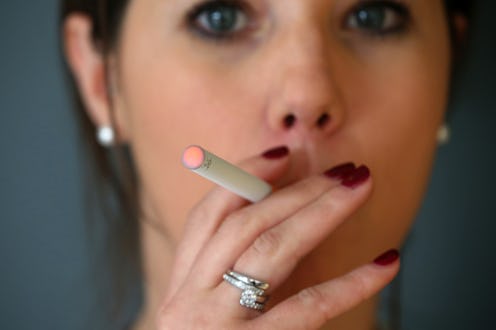News
The FDA Wants To Ban E-Cigarettes For Minors
The Food and Drug Administration is making big moves when it comes to tobacco, proposing the ban on sales of e-cigarettes to minors. On Thursday, the FDA announced the proposal of first-ever regulations for nicotine vapor dispensers, as well as rules for flavored cigars and nicotine gels. The recommendations come with the spike in e-cigarette sales, especially among younger crowds.
It's just talk for now, but the proposal is the first step in the agency putting its foot down, much like the way they regulate traditional cigarettes. If passed, we can say goodbye to free samples of the vapes as well as vending machines sales, unless they're in areas not frequented by anyone under 18. The products will also be required to have nicotine health warning labels.
They're typically used by people who want to quit smoking, but e-cigarettes are gaining popularity with teens. The battery-powered electronic devices vaporize nicotine in a water-based solution to give people a little fix sans the additives and tobacco. While many say they are safer than traditional cigarettes, others argue there's not enough research out there on the risks.
"It’s like the wild, wild West,” FDA commissioner Dr. Margaret Hamburg told NBC. “Companies can do whatever they want and they can market however they want.”
Chicago recently banned e-cigarettes indoors and the European Parliament passed legislation requiring the devices to requiring to carry health warnings and be childproof. Back in the U.S., the FDA is unsure of how many types are on the market, which is why they're calling for stricter rules. Still, ads or Internet sales of the popular devices won't be banned, nor will the use of flavors — which critics say appeal to young children.
Cigars, pipe tobacco, nicotine gels, water pipe tobacco, and hookahs will also fall under proposed regulation. Producers will be subject to FDA inspection, with some manufacturers required to register with the administration and provide details of ingredients, processes, and scientific data.
It's not the first time the agency has taken actions against e-cigs. After finding trace amounts of toxic ingredients in some samples, the FDA looked toward regulating the products as drug-delivery devices in 2008. It was an unsuccessful attempt however, since a federal judge ruled it could only do so if they made therapeutic claims. This time around, it'll be months until we see some changes. Suggestions will be open to the public for 75 days for comment, after which recommendations will be finalized.
